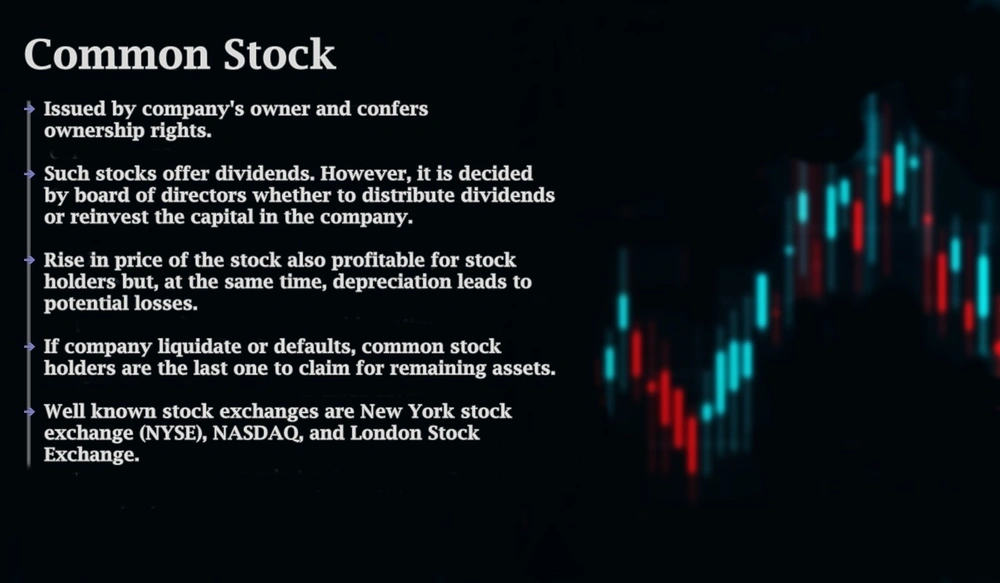
Table of Contents
Introduction
Equity securities represent ownership in a corporation, entitling shareholders to a portion of the company’s profits and assets. These securities, commonly known as stocks or shares, can appreciate in value over time, providing potential capital gains for investors. Equity securities are traded on stock exchanges, facilitating liquidity and marketability. By investing in equities, shareholders gain voting rights, influencing corporate governance and decision-making. Debt security holders are not privilege to enjoy such rights. This form of investment is crucial for companies seeking to raise capital for growth and operations while offering investors an opportunity to participate in the financial success and governance of the business.
Equity Securities
General perception of investment is potential profit either in the form of periodic or fixed term interest, or in the form of dividends. However, in financial world, investment in equity securities confers ownership rights to asset holder. Huge amount of capital is raised by companies. Holder of such securities are residual owner. Their claims are fulfilled only when company pay all their debts and obligation made to others. There are no fixed maturity dates in such securities, and asset’s value is determined by company’s performance.
Key features of Equity Securities

- Equity securities represent a significant aspect of the investment landscape, offering individuals the opportunity to partake in the ownership and success of corporations. At their core, these securities signify an ownership interest, granting shareholders a stake in the company’s assets and profits. This ownership extends beyond mere financial interest, as shareholders are endowed with voting rights, enabling them to influence key corporate decisions, such as the election of the board of directors and approval of major corporate actions.
- A notable feature of equity securities is the potential for dividend income. Companies may choose to distribute a portion of their earnings to shareholders in the form of dividends, which can provide a steady income stream. Additionally, equity securities offer the possibility of capital gains, allowing investors to profit from the appreciation in the value of their shares over time.
- The liquidity and marketability of equity securities are facilitated by their listing on stock exchanges, where shares can be easily bought and sold. This ease of transaction makes equities an accessible and flexible investment option for many. However, it is important to recognize that shareholders hold a residual claim on the company’s assets. In the event of liquidation, they are compensated after creditors and preferred shareholders, making their investment inherently riskier.
- Equity securities come in various forms, including common and preferred stocks. Common stocks typically provide voting rights and the potential for dividends, while preferred stocks often offer fixed dividend payments and a higher claim on assets, though usually without voting rights.
- Investing in equity securities involves a balance of risk and reward. The value of these securities can be volatile, influenced by a myriad of factors such as company performance, industry dynamics, economic conditions, and market sentiment. Despite this volatility, the potential for higher returns makes equities an attractive option for investors willing to embrace the associated risks.
- Furthermore, equity markets operate under stringent regulatory oversight to ensure fairness and protect investors. Regulatory bodies, such as the Securities and Exchange Commission (SEC) in the United States, play a crucial role in maintaining the integrity of these markets.
Types of Equity Securities
There are two major types of equity securities: common stock and preferred stock.
Common Stock

These are simple equity securities and bear no complexities which the preferred stock bears. Holders of such securities or instrument have the voting rights when it comes to select the company’s board of director or the business decisions to be made. Such influence can be gained by holding maximum number of shares. The following are the major points of common stocks:
- Common stocks are issued by company’s owner. Common stock confers ownership rights and their claim on company’s assets and earning is residual in nature. Companies also establish other contracts for capital generation. So, the owner of common stock can only claim for assets and earning when company fulfills other obligations like the fulfilment of contract requirement of debit securities holder. They have voting rights which can be used in decisions related to company’s management especially selection of board of directors. Such privileged position can be achieved only when holders have maximum number of shares.
- Investment in any financial instruments is made for profit. By holding common stock of company, they may receive dividends. However, it is not certain in this context. Only Board of Directors can decide whether to distribute dividends among common stock holder or to reinvest capital in the company.
- When it comes to benefit and profit, holders of such instruments can make profit when price of instrument rises in market. however, with potential gains, they can also face price depreciation of stock value.
- Investors who have the risk-taking abilities and patience can hold such financial instruments. This also provides investors high returns. Investors who do not feel comfortable in such investments opt other investment options which provides them safety of funds.
- If company liquidate or defaults, common stock holders are the last one to claim for remaining assets. Common stocks are highly traded on stock exchanges. Well known stock exchanges are New York stock exchange (NYSE), NASDAQ, and London Stock Exchange.
Preferred Stock

Preferred stocks are sometime referred to as hybrid securities, because it contains elements of both debit security and equity security. Preferred stock confers ownership rights to security holder that is why it is equity instrument. At the same time, it allows holder to claim for fixed payment. It gives this instrument a debit-like quality. The following are the points of preferred stock:
- As compare to common stock, preferred stock holder contains higher claims to company assets. When company liquidates, holder of such security is paid before common stock holder.
- A fixed dividend payment is given to common stock holder on specified regular time. Dividends may be suspended only if company faces financial difficulties.
- No voting rights are given.
- In the case of company liquidation, debit security holders will be the first one to claim for company assets. Preferred stock holders are not preferred over debit security holders. They are preferred only over the common stock holder.
Equity securities as a whole is used for capital funding for companies. Companies have multiple expenses to cover. Potential growth of company is required in competitive market. So, these securities are used for capital generation, and then uses it for company’s growth.
Risk Associated

Investor must consider the following things before taking any decision because financial markets are not risk-free. Considering the following factors will help investor in taking right decision:
- Market Risk: Equity securities are susceptible to fluctuations in value due to overall market conditions, economic factors, and investor sentiment, potentially leading to significant losses.
- Company-Specific Risk: Factors unique to a company, such as poor management decisions, product recalls, or legal issues, can adversely impact its stock price.
- Liquidity Risk: Some equity securities, particularly those of smaller or lesser-known companies, may not be easily sold at their market value, leading to potential losses when trying to sell.
- Volatility Risk: Equity securities can experience rapid price changes over short periods, resulting in substantial short-term gains or losses.
- Dividend Risk: There is no assurance that a company will continue to pay dividends. Financial difficulties may lead companies to reduce or eliminate dividend payments.
- Economic and Political Risk: Shifts in economic conditions, government policies, regulations, or political stability can affect the performance of equity securities.
- Interest Rate Risk: Rising interest rates can negatively affect equity prices, especially for companies with high debt levels or those in interest-sensitive sectors.
- Inflation Risk: Inflation can diminish the real value of returns from equity securities, particularly if a company’s earnings do not keep pace with inflation.
- Currency Risk: For investors holding foreign equity securities, fluctuations in exchange rates can impact the value and returns of their investments.
- Event Risk: Unforeseen events such as natural disasters, terrorist attacks, or pandemics can significantly impact the stock market and individual equity securities.
- Regulatory Risk: Changes in laws and regulations can affect the operations and profitability of companies, thereby influencing their stock prices.
Conclusion
In conclusion, while equity securities offer the potential for ownership in a company, capital appreciation, and dividend income, they come with a variety of risks that investors must carefully consider. Market volatility, company-specific issues, liquidity challenges, and broader economic and political factors can all significantly impact the value of these investments. Moreover, uncertainties such as interest rate changes, inflation, currency fluctuations, unforeseen events, and regulatory changes add layers of complexity and risk. Therefore, investors need to conduct thorough research, diversify their portfolios, and align their investment strategies with their risk tolerance and financial goals to navigate the risks associated with equity securities effectively.
Frequently Asked Question (FAQs)
What is the difference between common stock and preferred stock?
Common stock typically provides voting rights and potential dividends, while preferred stock often offers fixed dividend payments and a higher claim on assets, but usually without voting rights.
How do I buy equity securities?
Equity securities can be purchased through brokerage accounts, either online or through a financial advisor, by placing buy orders on stock exchanges where the company’s shares are listed
What factors influence the value of equity securities?
The value of equity securities can be influenced by factors such as company performance, industry trends, economic conditions, market sentiment, and specific events affecting the company.
How do dividends work for equity securities?
Companies may distribute a portion of their earnings to shareholders as dividends, which can be regular or special payments based on the company’s profitability and dividend policy.
Are equity securities suitable for long-term investing?
Equity securities can be suitable for long-term investing, especially for investors seeking growth and willing to withstand short-term market fluctuations. Long-term investing allows investors to benefit from the potential for capital appreciation and compounding returns over time.
I’m Abdullah Shah, a content writer with three years of experience in crafting engaging and informative content. My background in market analysis complements my work, allowing me to create content that resonates with audiences. I’m also a seasoned practitioner in the forex and crypto markets, with a strong foundation and deep interest in finance. My passion for the financial world drives me to produce content that is both insightful and valuable for those interested in understanding market trends and financial strategies.





